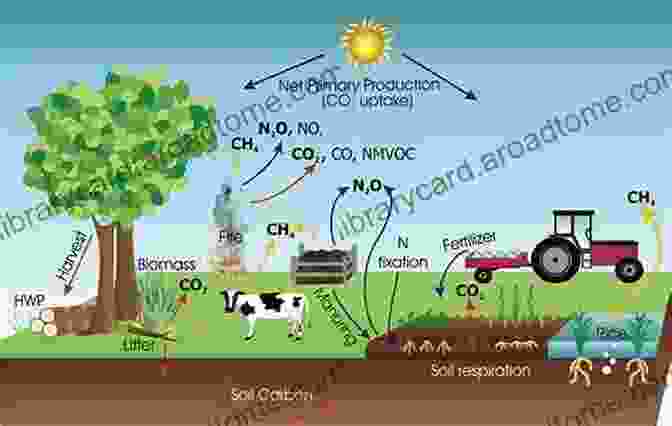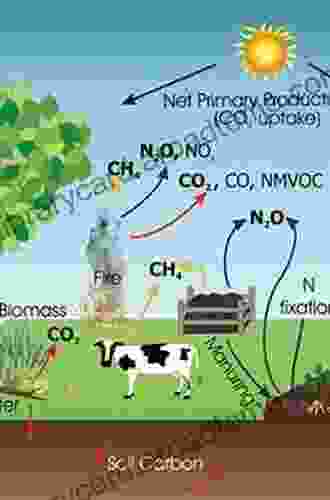Unveiling the Biochar Solution: Carbon Farming's Answer to Climate Change

In the face of an impending climate crisis, the search for innovative solutions to mitigate and adapt to its devastating effects intensifies. Among the promising approaches gaining significant attention is carbon farming, a practice that harnesses natural processes to capture and store carbon dioxide from the atmosphere. One revolutionary technique within carbon farming is the utilization of biochar. This article delves into the transformative potential of the biochar solution, exploring its multifaceted benefits for soil health, carbon sequestration, and climate change mitigation.
4.6 out of 5
| Language | : | English |
| File size | : | 1265 KB |
| Text-to-Speech | : | Enabled |
| Screen Reader | : | Supported |
| Enhanced typesetting | : | Enabled |
| Word Wise | : | Enabled |
| Print length | : | 225 pages |
What is Biochar?
Biochar, a sustainable form of charcoal, is created through a process called pyrolysis, where organic materials such as wood chips, plant matter, or agricultural residues are heated to high temperatures in an oxygen-limited environment. This process yields a porous, carbon-rich material with a remarkable ability to store carbon.

The Process of Biochar Production
1. Feedstock Selection: Organic materials such as wood chips, plant matter, or agricultural residues are gathered as the feedstock for biochar production. 2. Pyrolysis: The feedstock is heated to high temperatures (typically between 400-700°C) in an oxygen-limited environment. This process drives off volatile components, leaving behind a carbon-rich residue—biochar. 3. Activation: To enhance the adsorption capacity and surface area of the biochar, it can be further treated through physical or chemical activation processes.
Benefits of Biochar for Soil Health
The application of biochar to soil offers a multitude of benefits, including:
1. Carbon Sequestration
Biochar's porous structure and high carbon content allow it to act as a long-term carbon sink. When incorporated into soil, it binds to and stabilizes carbon, preventing its release back into the atmosphere. This carbon sequestration potential contributes significantly to mitigating climate change.
2. Soil Structure Improvement
The porous nature of biochar enhances soil structure by increasing aeration and water retention. This improved drainage and moisture retention capacity supports root development, nutrient uptake, and overall plant growth.
3. Nutrient Retention and Availability
Biochar's surface provides a habitat for beneficial microbes that enhance nutrient cycling in the soil. It also adsorbs and releases nutrients, such as nitrogen, phosphorus, and potassium, making them more readily available for plant uptake.
4. Soil pH Regulation
Biochar has a slightly alkaline pH, which can help neutralize acidic soils and improve nutrient availability. This pH regulating effect is particularly beneficial in acidic agricultural soils.
Biochar's Role in Carbon Farming
Carbon farming practices, such as cover cropping, reduced tillage, and agroforestry, aim to increase carbon storage in soil and vegetation. Biochar plays a crucial role in these practices by:
1. Enhancing Carbon Sequestration
When applied to soil under carbon farming systems, biochar significantly increases the soil's capacity to capture and store carbon. This enhanced carbon sequestration contributes to mitigating atmospheric carbon dioxide levels.
2. Improving Soil Health and Crop Yields
By improving soil structure, nutrient retention, and water availability, biochar enhances crop yields and overall agricultural productivity. This increased productivity offsets the emissions associated with biochar production, making it a sustainable solution.
Benefits of Biochar for Climate Change Mitigation
The biochar solution offers a multifaceted approach to climate change mitigation:
1. Greenhouse Gas Reduction
Through carbon sequestration, biochar effectively reduces greenhouse gas emissions by capturing and storing carbon dioxide from the atmosphere. This reduction in atmospheric carbon dioxide levels contributes to mitigating climate change.
2. Soil Carbon Management
Biochar promotes soil carbon storage, preventing its release back into the atmosphere through decomposition or erosion. This long-term carbon storage contributes to climate change adaptation and resilience.
3. Sustainable Alternative to Fossil Fuels
Biochar can be used as a sustainable energy source in the form of biochar briquettes or pellets. This renewable energy alternative to fossil fuels reduces greenhouse gas emissions and promotes energy independence.
Case Studies and Success Stories
Numerous case studies and success stories demonstrate the transformative impacts of the biochar solution:
1. Biochar in Agriculture
In Hawaii, the application of biochar to sugarcane fields significantly increased soil carbon content, improved soil health, and enhanced crop yields. This sustainable practice reduced fertilizer requirements and greenhouse gas emissions, promoting both agricultural productivity and environmental sustainability.
2. Biochar for Forest Restoration
In Our Book Libraryian rainforests, biochar was used to restore degraded soils and promote reforestation. The addition of biochar enhanced soil fertility, increased tree growth rates, and accelerated the recovery of the forest ecosystem.
The biochar solution offers a groundbreaking and sustainable approach to combatting climate change and ensuring food security. By improving soil health, enhancing carbon sequestration, and mitigating greenhouse gas emissions, biochar empowers carbon farming practices to make a tangible difference in the fight against climate change. As we continue to explore and harness the potential of biochar, it is poised to play a pivotal role in shaping a more sustainable and resilient future for generations to come.
4.6 out of 5
| Language | : | English |
| File size | : | 1265 KB |
| Text-to-Speech | : | Enabled |
| Screen Reader | : | Supported |
| Enhanced typesetting | : | Enabled |
| Word Wise | : | Enabled |
| Print length | : | 225 pages |
Do you want to contribute by writing guest posts on this blog?
Please contact us and send us a resume of previous articles that you have written.
 Book
Book Novel
Novel Page
Page Chapter
Chapter Text
Text Story
Story Genre
Genre Reader
Reader Library
Library Paperback
Paperback E-book
E-book Magazine
Magazine Newspaper
Newspaper Paragraph
Paragraph Sentence
Sentence Bookmark
Bookmark Shelf
Shelf Glossary
Glossary Bibliography
Bibliography Foreword
Foreword Preface
Preface Synopsis
Synopsis Annotation
Annotation Footnote
Footnote Manuscript
Manuscript Scroll
Scroll Codex
Codex Tome
Tome Bestseller
Bestseller Classics
Classics Library card
Library card Narrative
Narrative Biography
Biography Autobiography
Autobiography Memoir
Memoir Reference
Reference Encyclopedia
Encyclopedia Alison Stieven Taylor
Alison Stieven Taylor Alison Lester
Alison Lester Christian Tielmann
Christian Tielmann Allison Scott
Allison Scott Alan Bryman
Alan Bryman Ron Sunog
Ron Sunog Allison Lee Palmer
Allison Lee Palmer Alicia Wilcox
Alicia Wilcox Alexey Moskalev
Alexey Moskalev Blythe Landry
Blythe Landry Alexander Gordon Smith
Alexander Gordon Smith Pascal Lienhardt
Pascal Lienhardt Justin Edelson
Justin Edelson Alan Walker
Alan Walker Alex F Schwartz
Alex F Schwartz Phil Yates
Phil Yates Jeffrey Ries
Jeffrey Ries Steve Lukather
Steve Lukather Alcir Santos Neto
Alcir Santos Neto Ronaldo I Borja
Ronaldo I Borja
Light bulbAdvertise smarter! Our strategic ad space ensures maximum exposure. Reserve your spot today!
 Tim ReedFollow ·17.6k
Tim ReedFollow ·17.6k David Foster WallaceFollow ·11.4k
David Foster WallaceFollow ·11.4k Yasunari KawabataFollow ·18.5k
Yasunari KawabataFollow ·18.5k Ray BlairFollow ·8.5k
Ray BlairFollow ·8.5k Brandon CoxFollow ·17.9k
Brandon CoxFollow ·17.9k Pat MitchellFollow ·2.9k
Pat MitchellFollow ·2.9k Zadie SmithFollow ·2.8k
Zadie SmithFollow ·2.8k Houston PowellFollow ·14.6k
Houston PowellFollow ·14.6k

 Joshua Reed
Joshua ReedBelieving, Living, and Enjoying by the Word: Unlock the...
In a world filled with...

 Cason Cox
Cason CoxUnveil the Extraordinary World of "The Alexiad": A...
Delve into the Heart of Byzantine...

 Junot Díaz
Junot DíazUnveiling the Intricacies of Intellectual Property: Your...
In today's knowledge-driven economy,...

 Aleksandr Pushkin
Aleksandr PushkinThe Life of Louise Mathew Gregory: A Tapestry of Triumphs...
A Woman of Extraordinary Substance Louise...

 Leon Foster
Leon FosterHomemade Lotion For Beginners: Transform Your Skincare...
Step into the world of...

 Terence Nelson
Terence NelsonUnveiling the Secrets of Radio, Television, and Film: An...
: Embarking on a Journey into the...
4.6 out of 5
| Language | : | English |
| File size | : | 1265 KB |
| Text-to-Speech | : | Enabled |
| Screen Reader | : | Supported |
| Enhanced typesetting | : | Enabled |
| Word Wise | : | Enabled |
| Print length | : | 225 pages |












